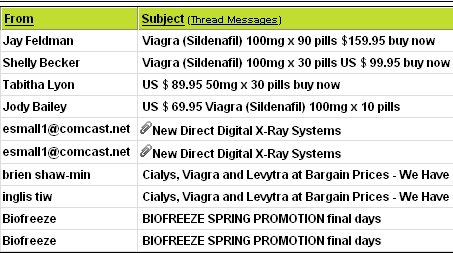Niche Industry E-Mail Spam is Irresponsible and Unprofessional
By Michael Dorausch, D.C.
Regardless of your e-mail provider, chances are there is spam in your e-mail inbox. This topic has been covered a gazillion times but it’s usually focused on the types of spam most of us typically receive. There’s the lottery winnings, the small-business loans, the cheap rates on medication, real estate and stock deals, and such. Spam like this is probably sent in the billions each day, and it’s a major drain on user productivity, electricity, and computer resources. Nobody likes spam (except maybe spammers) so why is it such a common practice for businesses to spam within their industry niches?

The junk mail that we all receive is pretty much simply referred to as spam. Unsolicited e-mail that’s coming from businesses within a niche industry I’d refer to as industry spam, but it’s really no different than the traditional form of spam. In these cases, spammers (oftentimes legitimate companies) may be buying e-mail lists that have been harvested or scraped from websites, have purchased lists from industry publications, organizations, and schools, or have collected industry e-mail lists from the one unsuspecting individual who accidentally e-mailed his/her entire list of colleagues. These are only some of the ways e-mails are collected.
This is not something that uniquely plagues the chiropractic industry and I suspect it’s even worse in the industries of medicine and dentistry. One of the more popular targeted spam e-mails I’ve been receiving lately has been the solicitation of large lists of medical doctor e-mail addresses and dentist e-mail addresses. Someone is buying these lists or I wouldn’t be seeing so many solicitations for them.
So as an industry (whether it be chiropractic, dentistry, medicine, or other) what is there we can do? The first thing to remember is that spam is spam and just because it’s coming from someone inside your field or profession, it’s not any less illegal, then traditional spam. It may actually be easier to shut down smalltime spammer’s as it’s not unlikely they’re sending mail from their home or business location. Looking again at the screenshot above, the e-mail for digital x-ray systems apparently was being sent from a Comcast account. In that case I would suggest e-mailing the ISP with a spam complaint. In the case of the company marketing products to chiropractors, the domain in the e-mail address belong to a company called Got Corporation. Checking their homepage I discover they have an anti-spam policy, and unsolicited e-mail spam can be reported from their contact us page.
It takes extra effort, but my years of computer experience has shown its better to take the time and report spam practices within one’s industry, since the results are cumulative. If enough people report the same individuals and companies, ISPs and campaign e-mail services will put greater scrutiny on their clients. Of course there are also methods for decreasing one’s likelihood for receiving spam, such as not filling out postcards at conventions, and not publicly displaying one’s e-mail address on their web site.
As editor for Planet Chiropractic, one of my e-mail accounts is publicly available so it’s a common target for unsolicited messages. As a result, efforts are taken to block and filter as much unwanted mail is possible. Unfortunately for me, there are those instances where e-mails from first-time senders land in the bulk mail box, so I make an effort to scan headings before hitting the purge button.
That’s my Friday rant, wishing you all a spam free weekend. 🙂
planetc1.com-news @ 1:03 pm | Article ID: 1206129830


